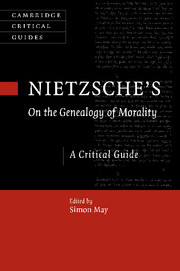Book contents
- Frontmatter
- Contents
- Contributors
- Acknowledgements
- Note on texts, translations, and references
- Introduction
- Chapter 1 The future of evil
- Chapter 2 On the nobility of Nietzsche’s priests
- Chapter 3 The genealogy of guilt
- Chapter 4 Why Nietzsche is still in the morality game
- Chapter 5 Who is the “sovereign individual”? Nietzsche on freedom
- Chapter 6 Ressentiment and morality
- Chapter 7 The role of life in the Genealogy
- Chapter 8 The relevance of history for moral philosophy
- Chapter 9 Why would master morality surrender its power?
- Chapter 10 “Genealogy” and the Genealogy
- Chapter 11 The promising animal
- Chapter 12 Nietzsche and the “aesthetics of character”
- Chapter 13 Nietzsche and the virtues of mature egoism
- Chapter 14 Une promesse de bonheur? Beauty in the Genealogy
- Bibliography
- Index
Chapter 14 - Une promesse de bonheur? Beauty in the Genealogy
Published online by Cambridge University Press: 05 November 2011
- Frontmatter
- Contents
- Contributors
- Acknowledgements
- Note on texts, translations, and references
- Introduction
- Chapter 1 The future of evil
- Chapter 2 On the nobility of Nietzsche’s priests
- Chapter 3 The genealogy of guilt
- Chapter 4 Why Nietzsche is still in the morality game
- Chapter 5 Who is the “sovereign individual”? Nietzsche on freedom
- Chapter 6 Ressentiment and morality
- Chapter 7 The role of life in the Genealogy
- Chapter 8 The relevance of history for moral philosophy
- Chapter 9 Why would master morality surrender its power?
- Chapter 10 “Genealogy” and the Genealogy
- Chapter 11 The promising animal
- Chapter 12 Nietzsche and the “aesthetics of character”
- Chapter 13 Nietzsche and the virtues of mature egoism
- Chapter 14 Une promesse de bonheur? Beauty in the Genealogy
- Bibliography
- Index
Summary
In this chapter I try to make some progress with three interpretive issues and a philosophical question. The first issue concerns section 6 of the Genealogy’s third essay. Most generally, I want to know what conclusions Nietzsche draws or suggests there about the nature of beauty. More specifically, I want to know why Nietzsche stops short of endorsing Stendhal’s conception, according to which beauty is a promise of happiness: he does cite Stendhal with approval, but only as the best of a bad lot. What is the reason for this? The second issue concerns the relations between what Nietzsche says in GM, III, 6, and what he says at the other two places in the Genealogy where beauty features at all prominently: on the face of it, none of the passages looks as if it has anything to do with the others, and that feels unsatisfactory. The third issue concerns the relation between Nietzsche’s remarks about beauty and his more general conception of values and valuing: assuming that the Genealogy is minimally self-consistent, we should expect these relata to be mutually illuminating; and I want to see whether, or to what extent, that expectation is borne out. For obvious reasons, these issues are interconnected, and, for most of the paper, I move back and forth between them freely, attempting to make progress across a broad front, as it were. The philosophical question, finally, is whether Nietzsche’s thoughts about beauty – as elucidated, I hope, through my treatment of the interpretive issues – deserve to be taken seriously as a contribution to aesthetics: do they help us to understand what beauty is, or in what sense beauty is a value for us? I conclude by suggesting that, as aestheticians at least, we have better reason to accept what Stendhal says than to go with the alternative that Nietzsche apparently prefers. I also think that this conclusion should be good for Nietzscheans.
The aesthetic problem
GM, III, 6, is set up as a critique of Kant’s aesthetics; it turns quite quickly into a critique of Schopenhauer; while Stendhal is mentioned a couple of times along the way as a corrective to both – without, however, receiving Nietzsche’s unqualified approval. It will be helpful to begin with an overview of the section, not least so as to identify the questions that it raises but leaves unanswered.
- Type
- Chapter
- Information
- Nietzsche's On the Genealogy of MoralityA Critical Guide, pp. 309 - 325Publisher: Cambridge University PressPrint publication year: 2011
- 1
- Cited by

